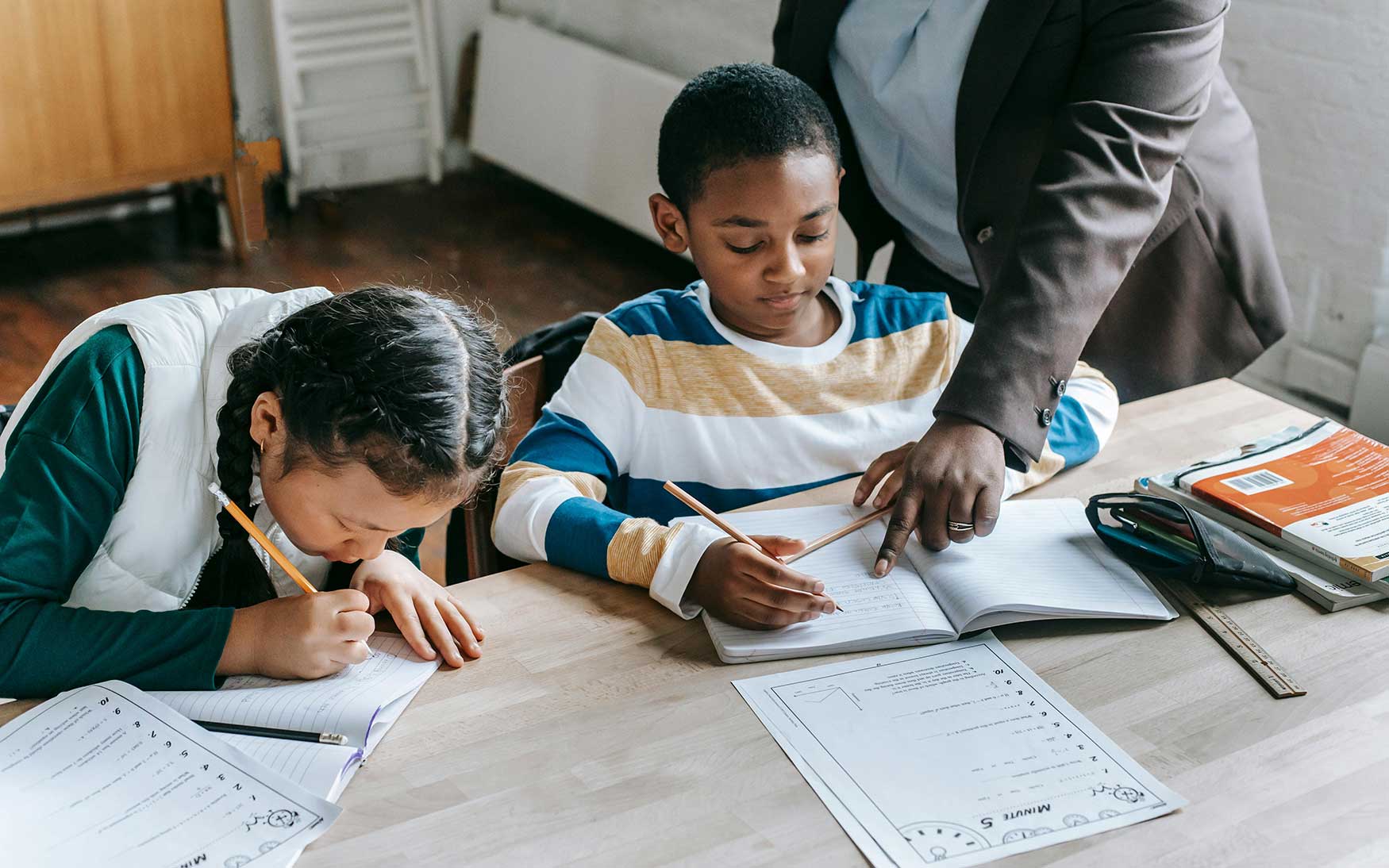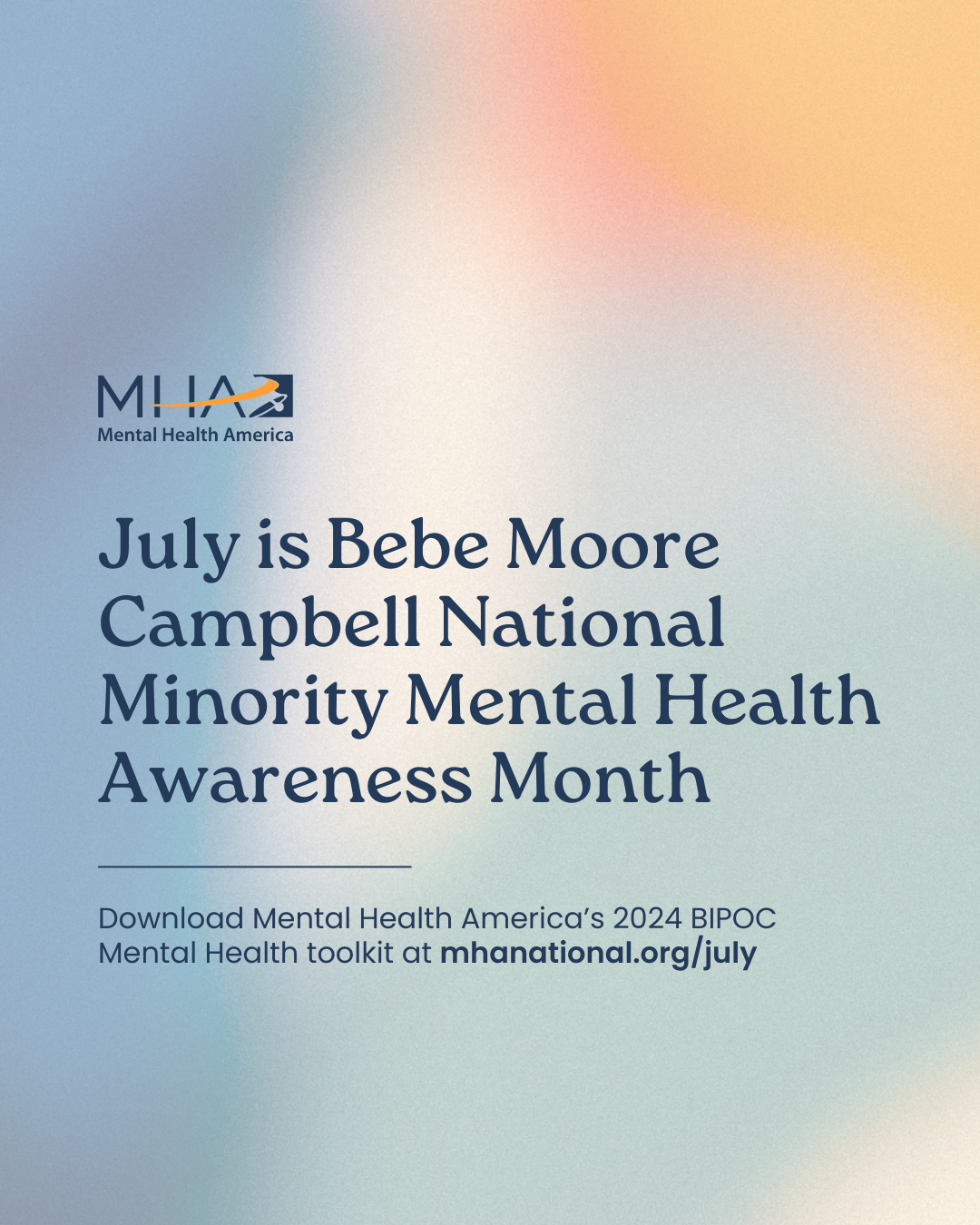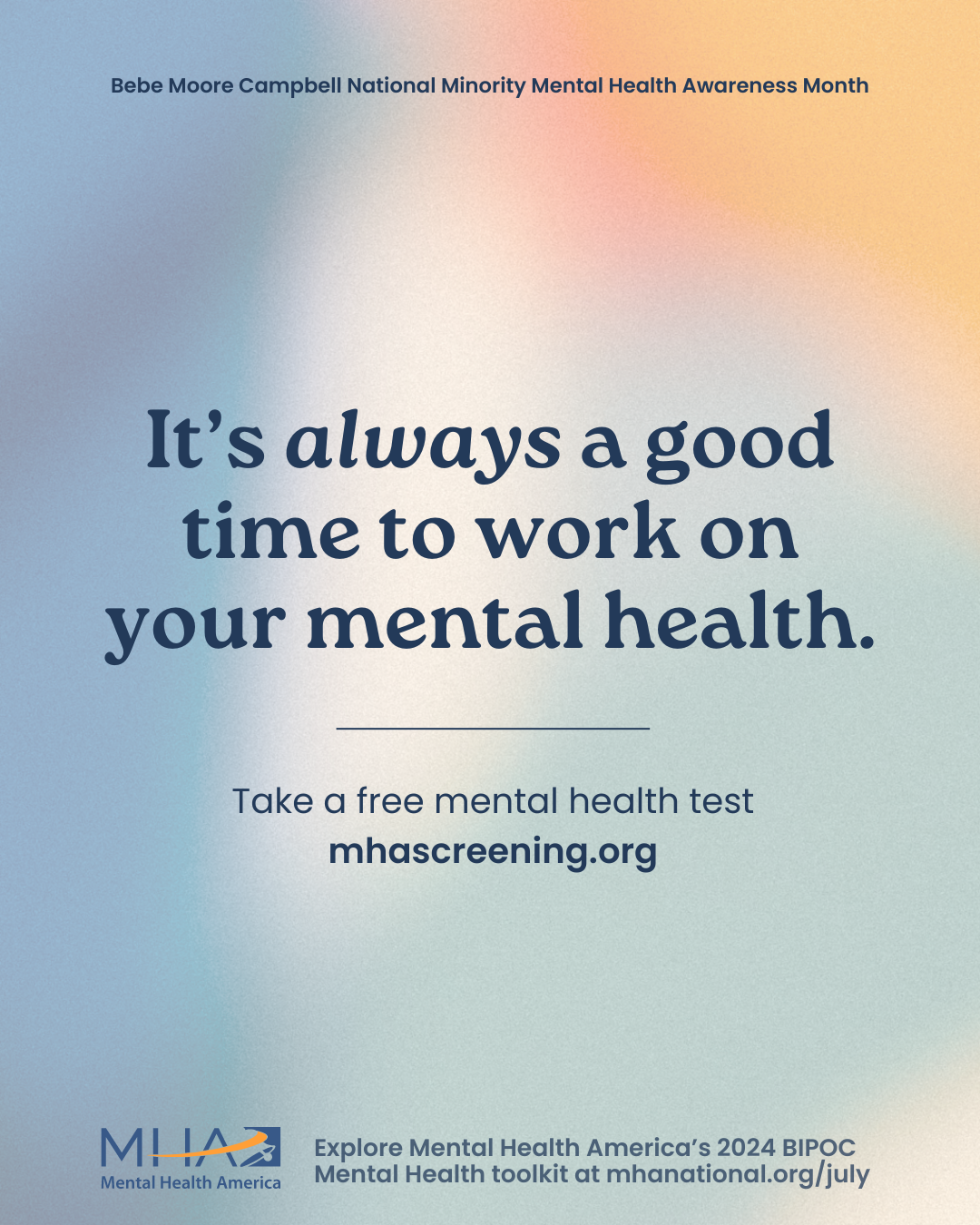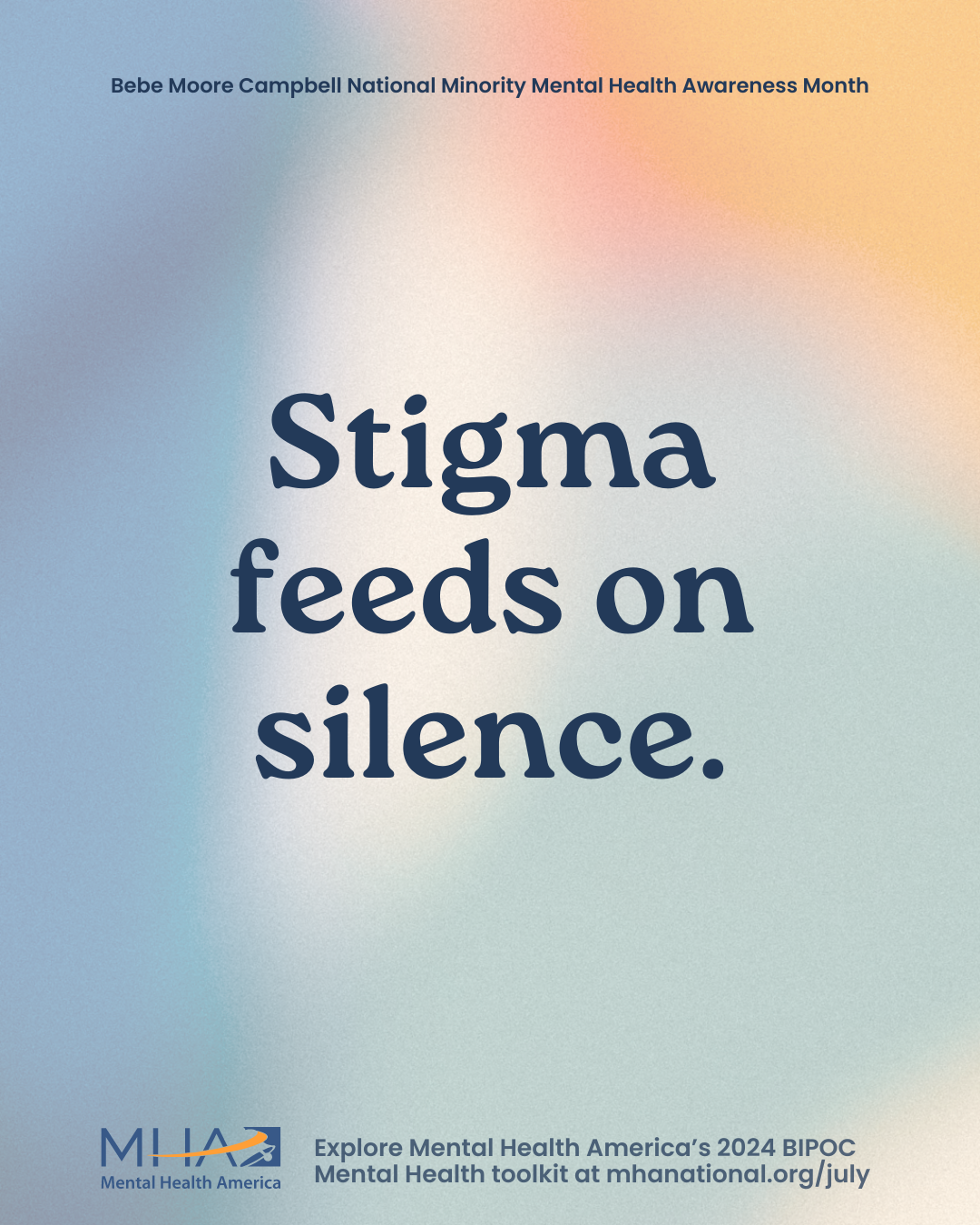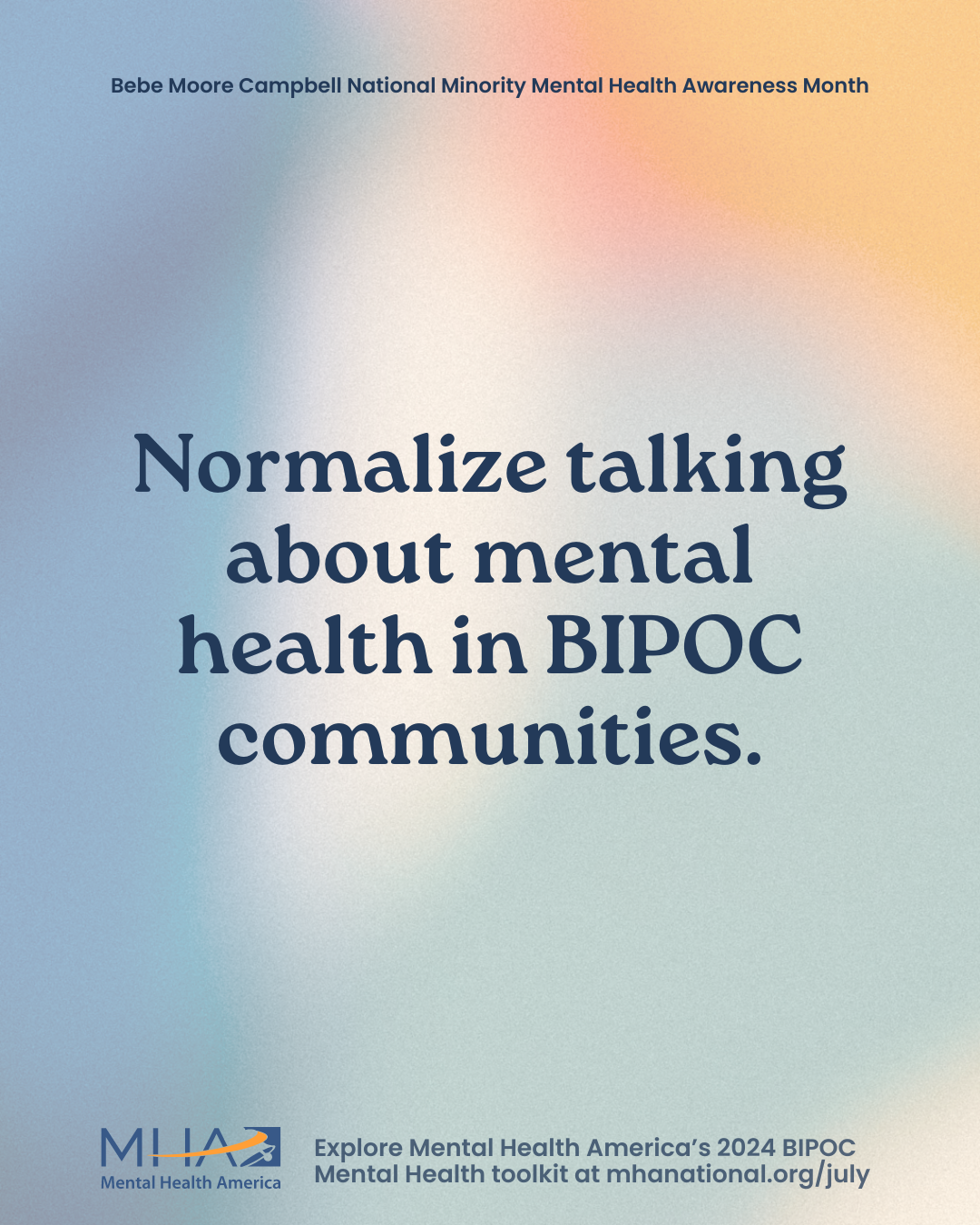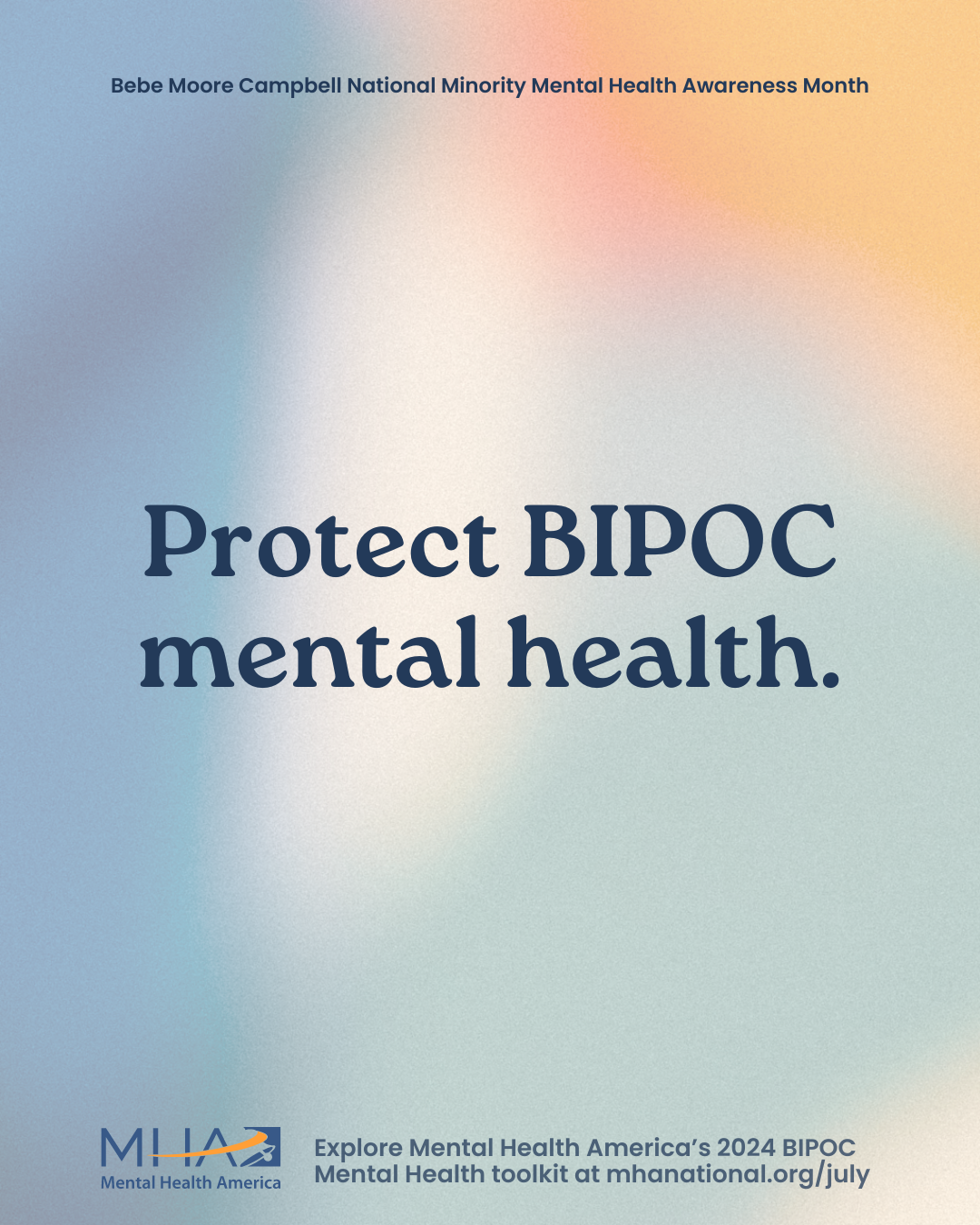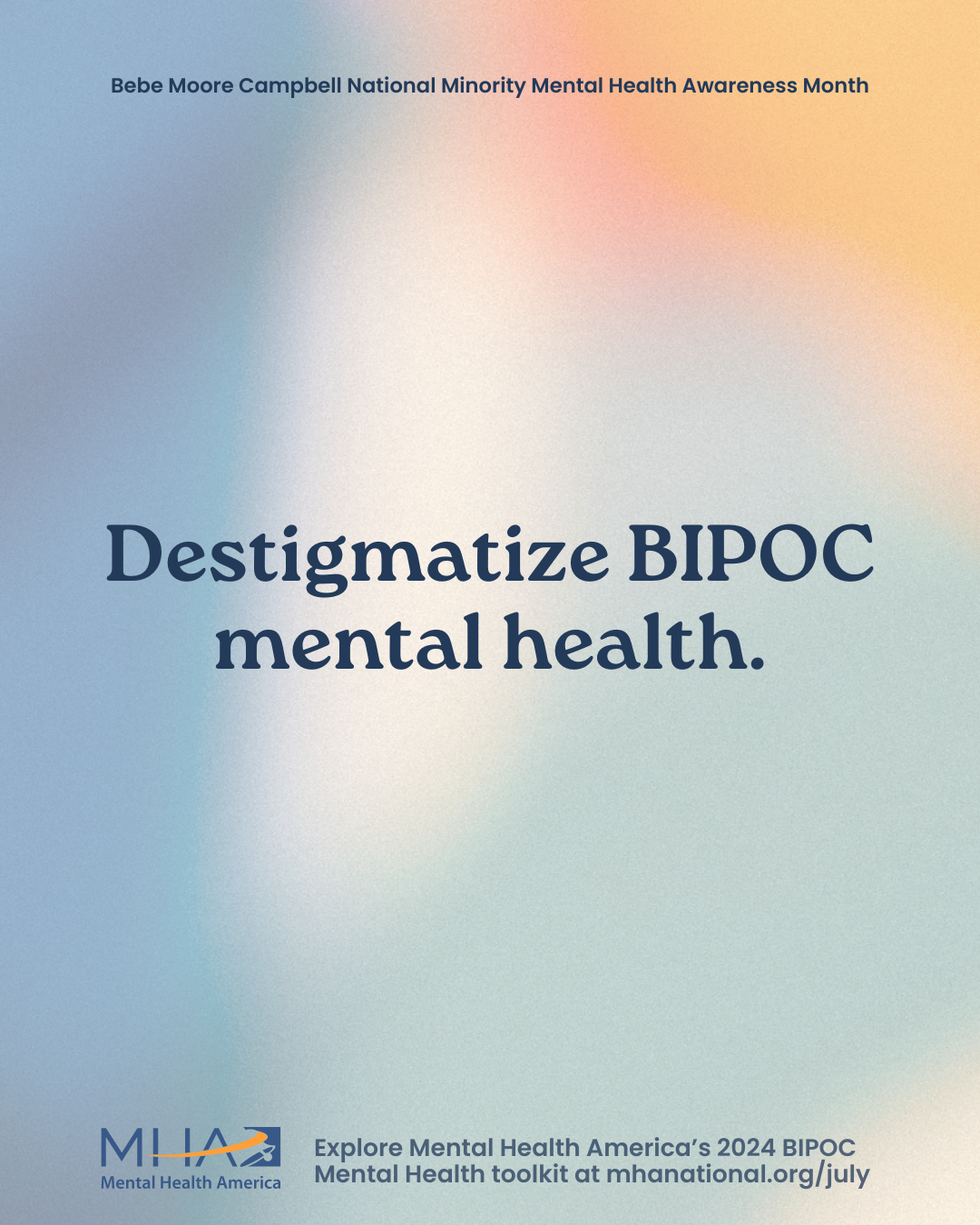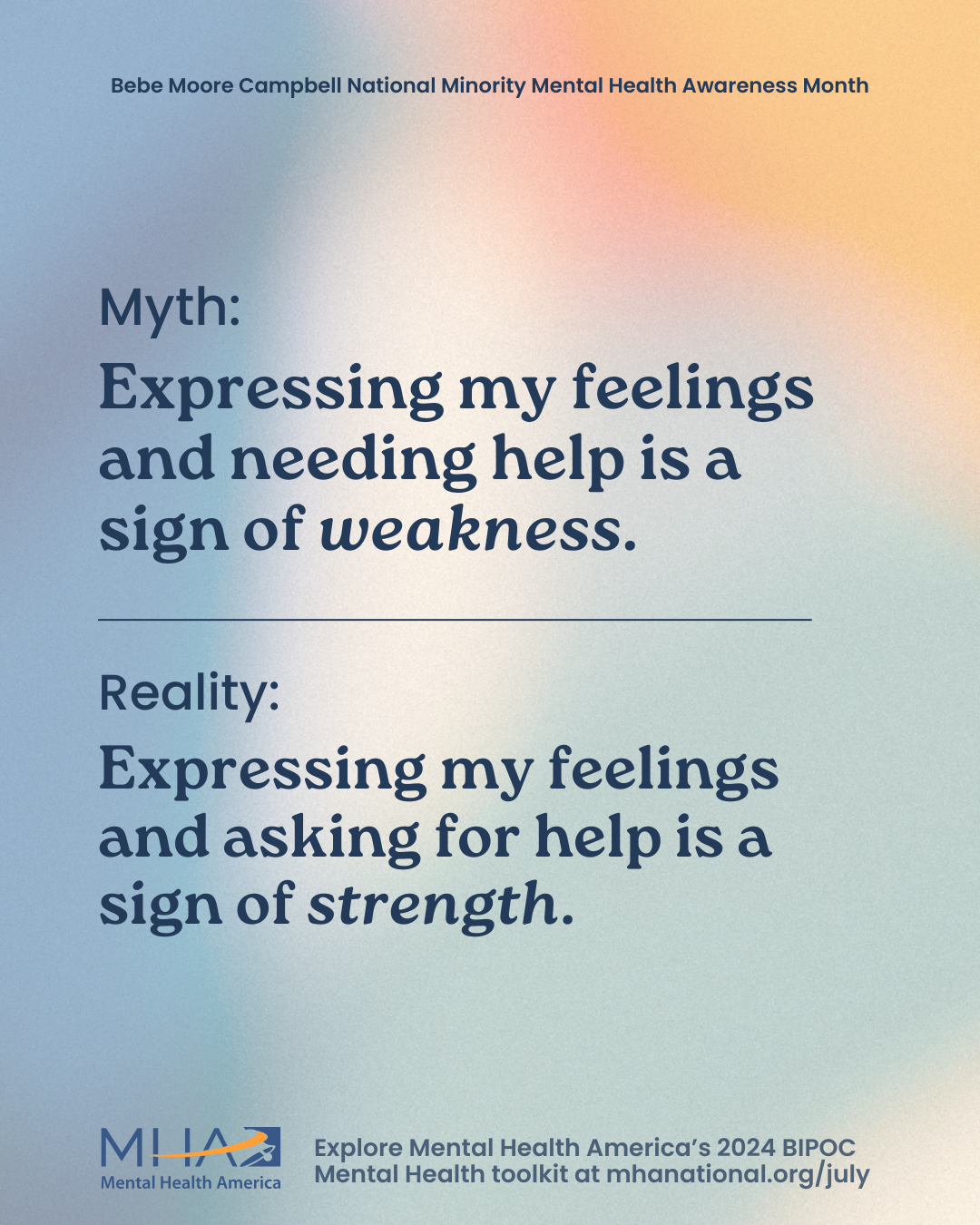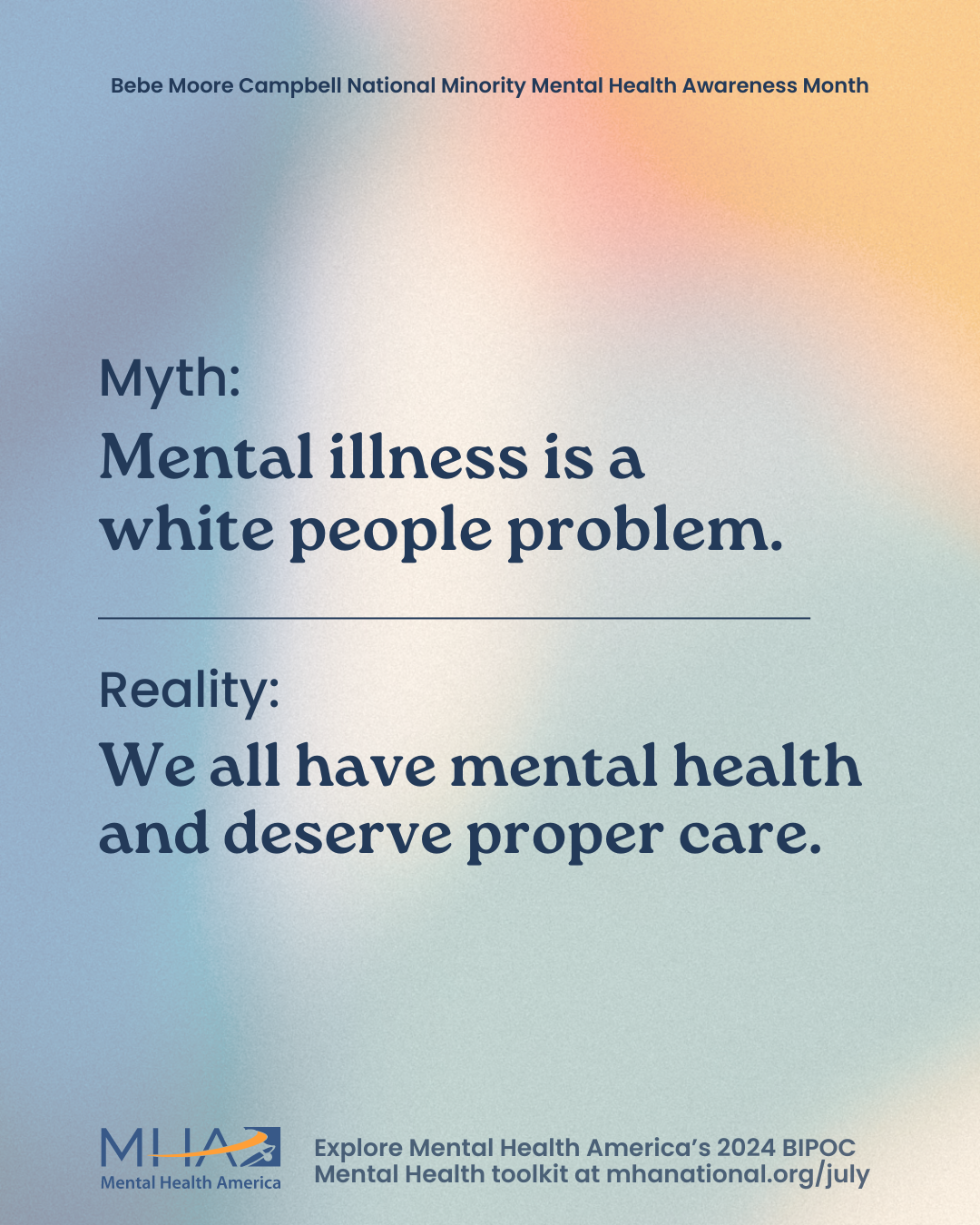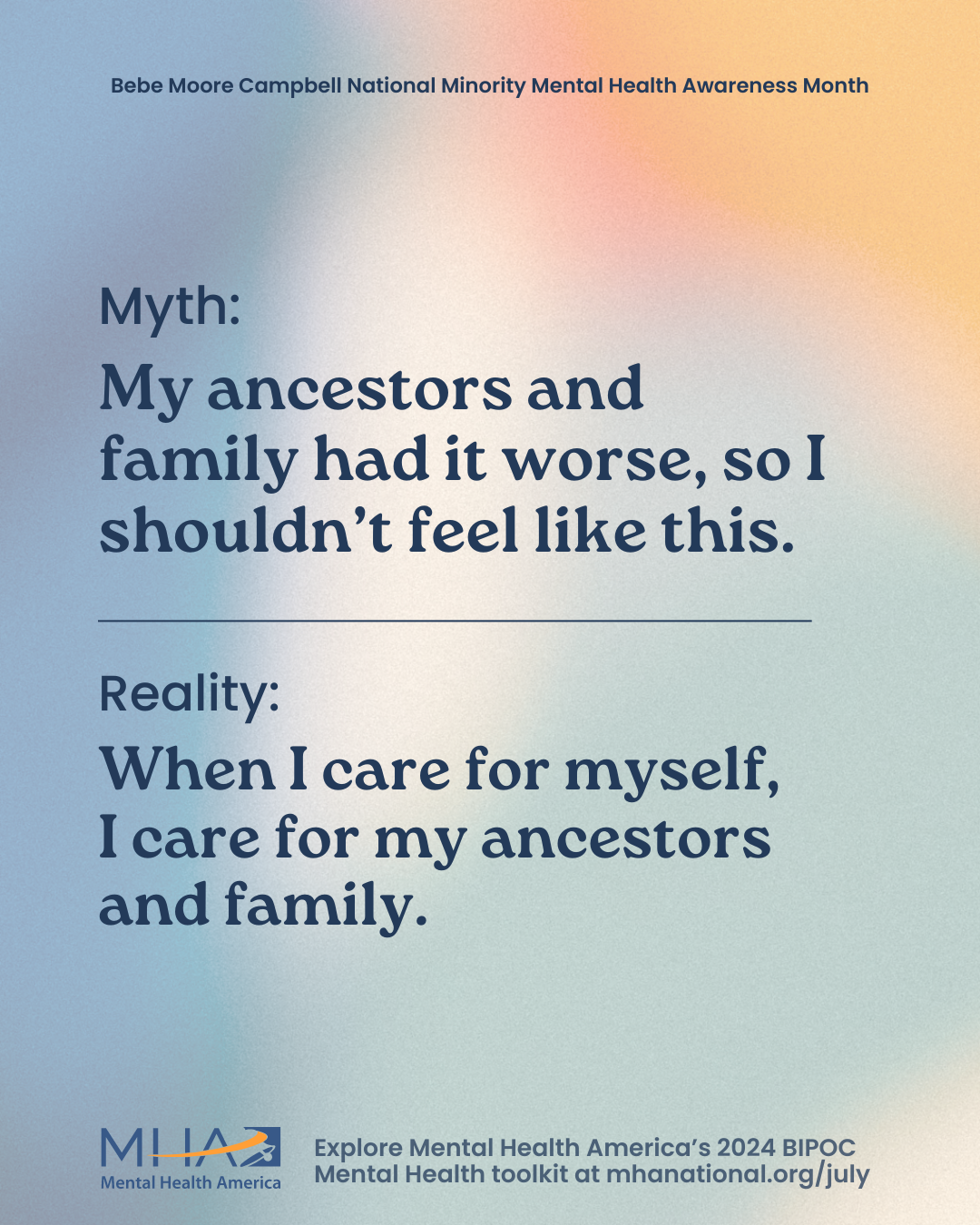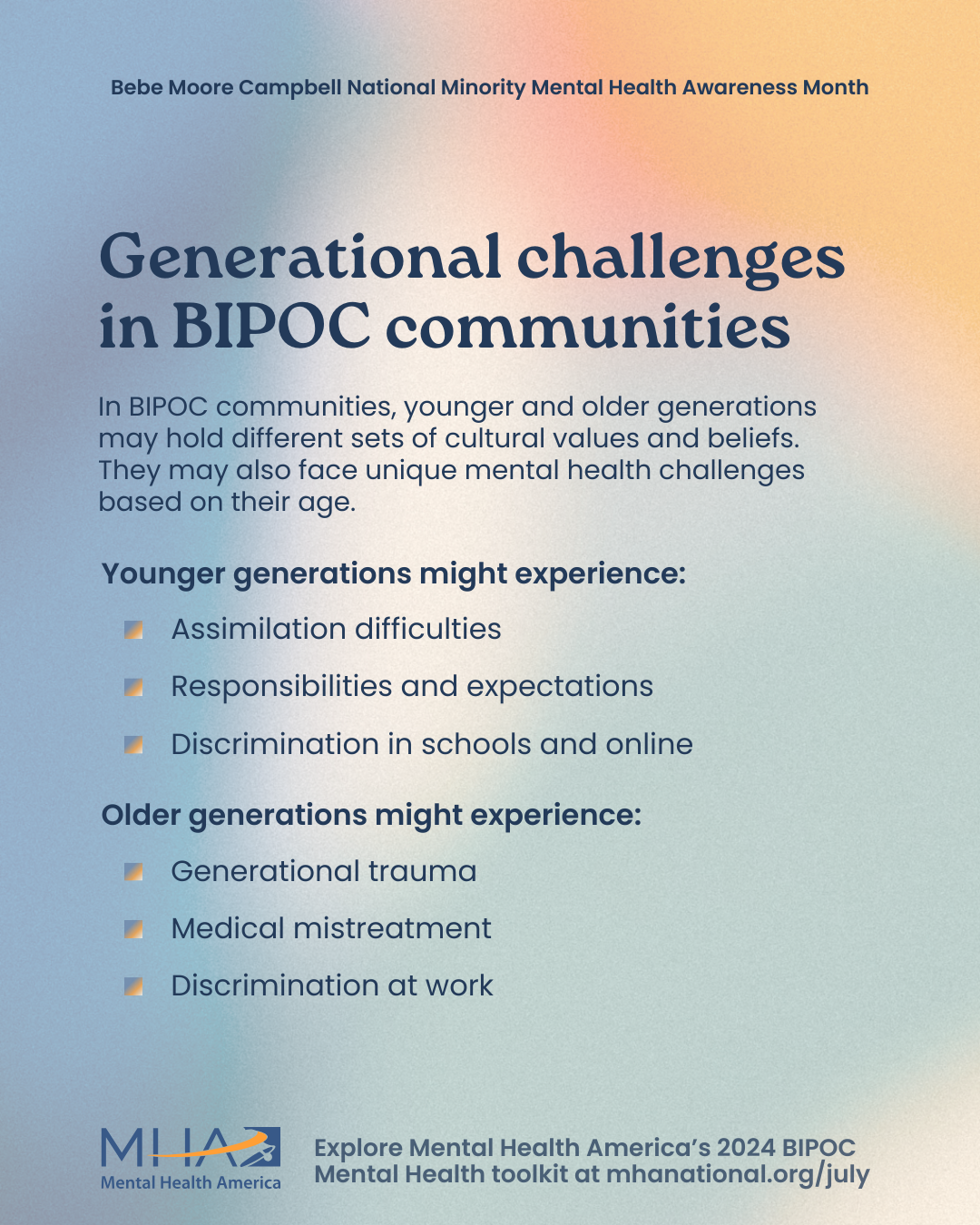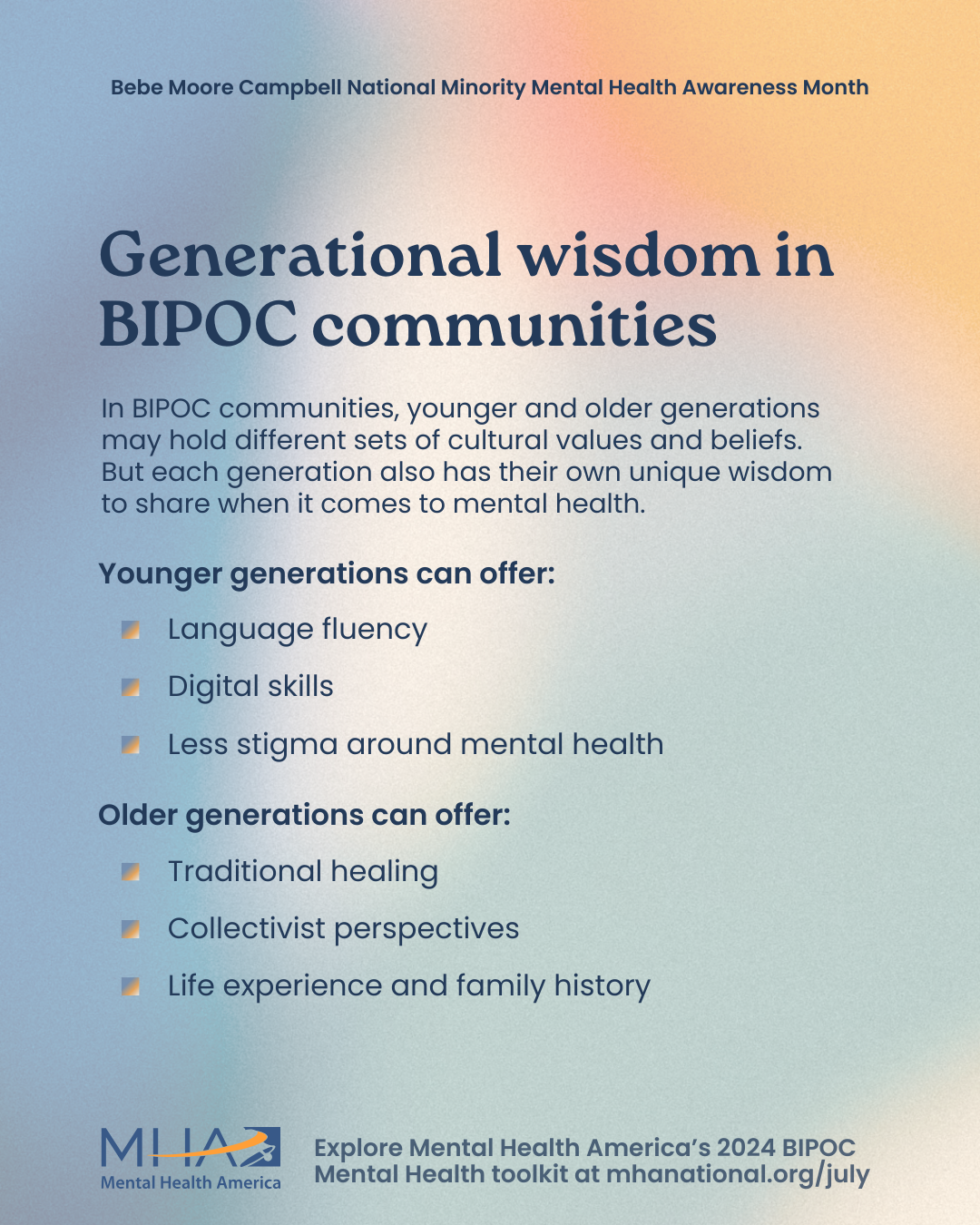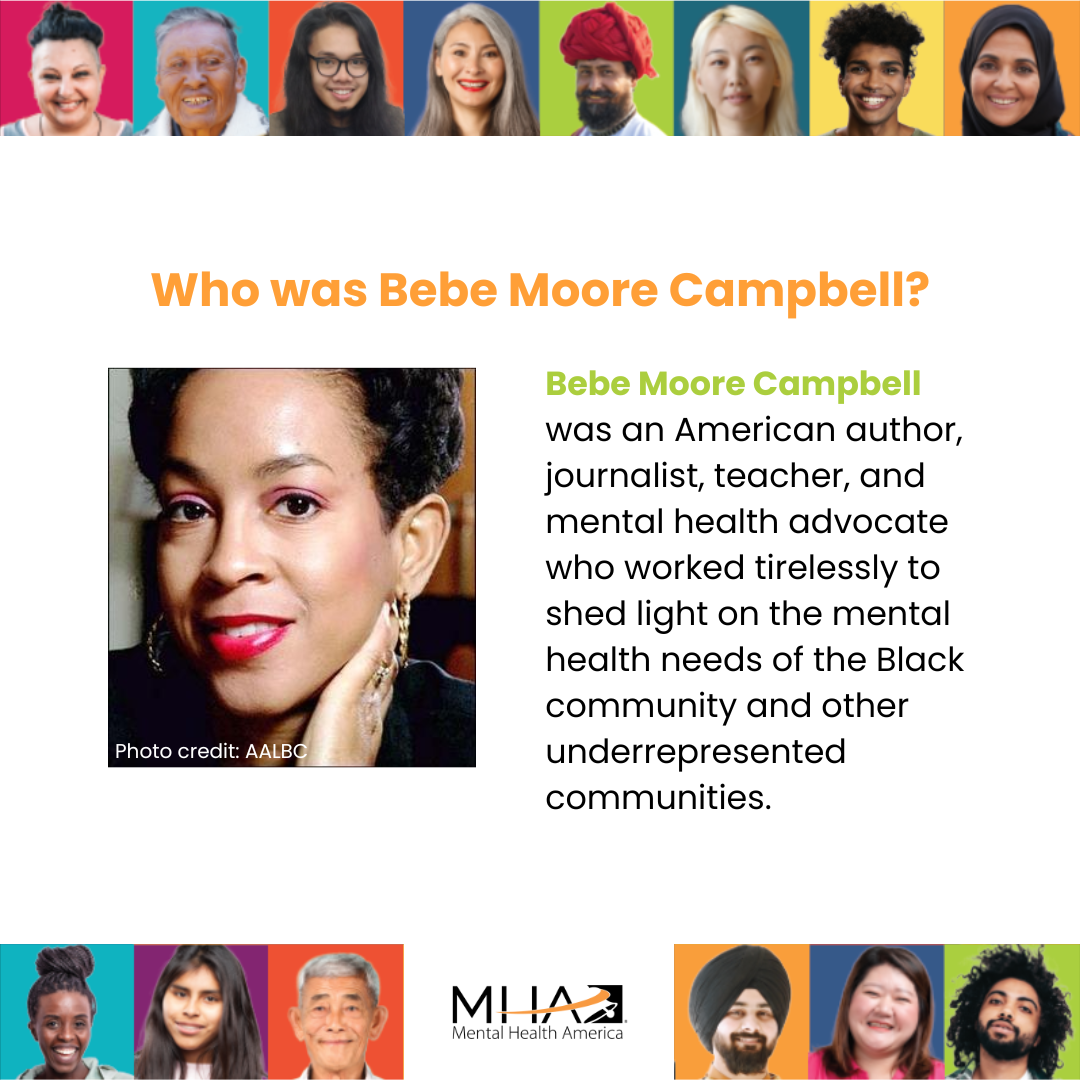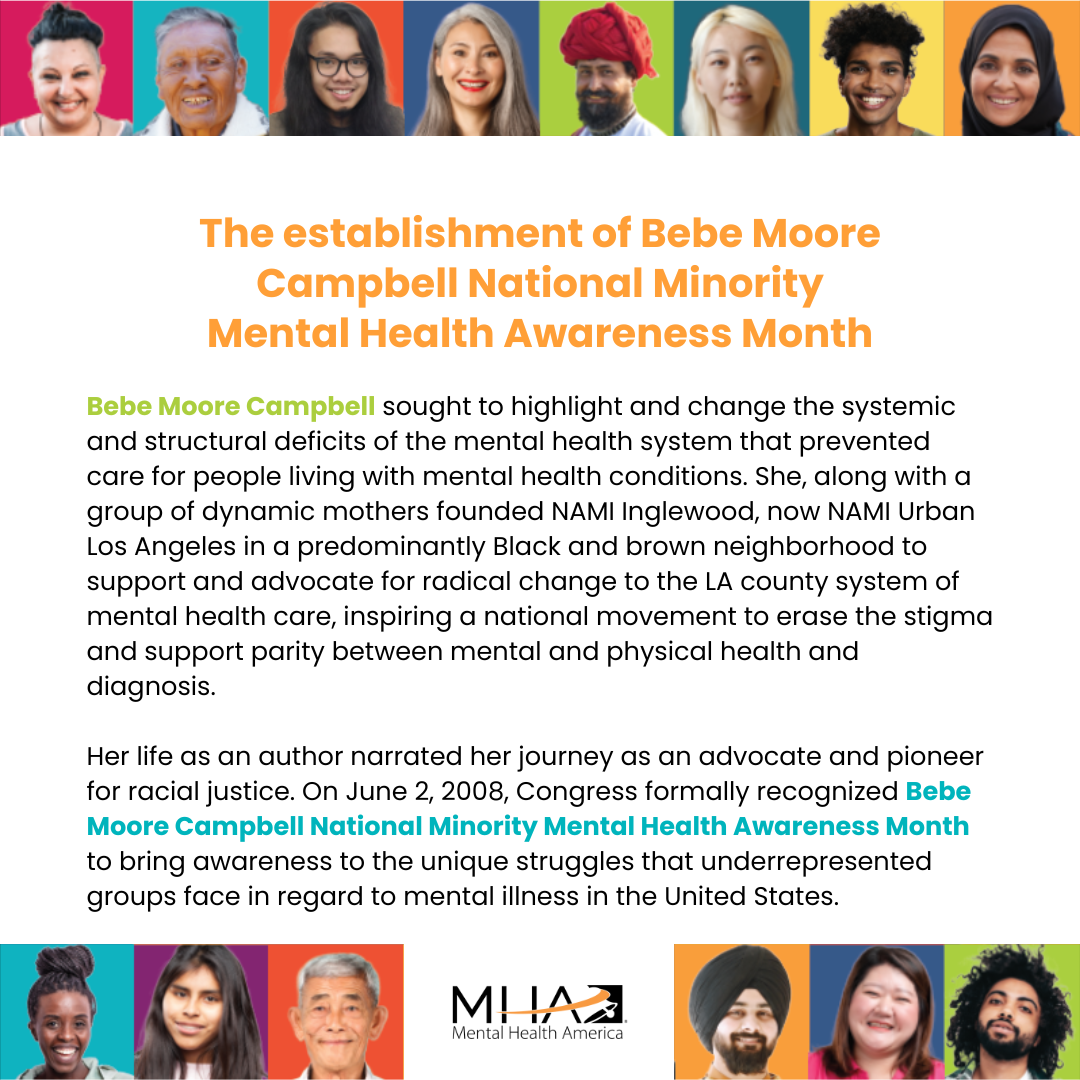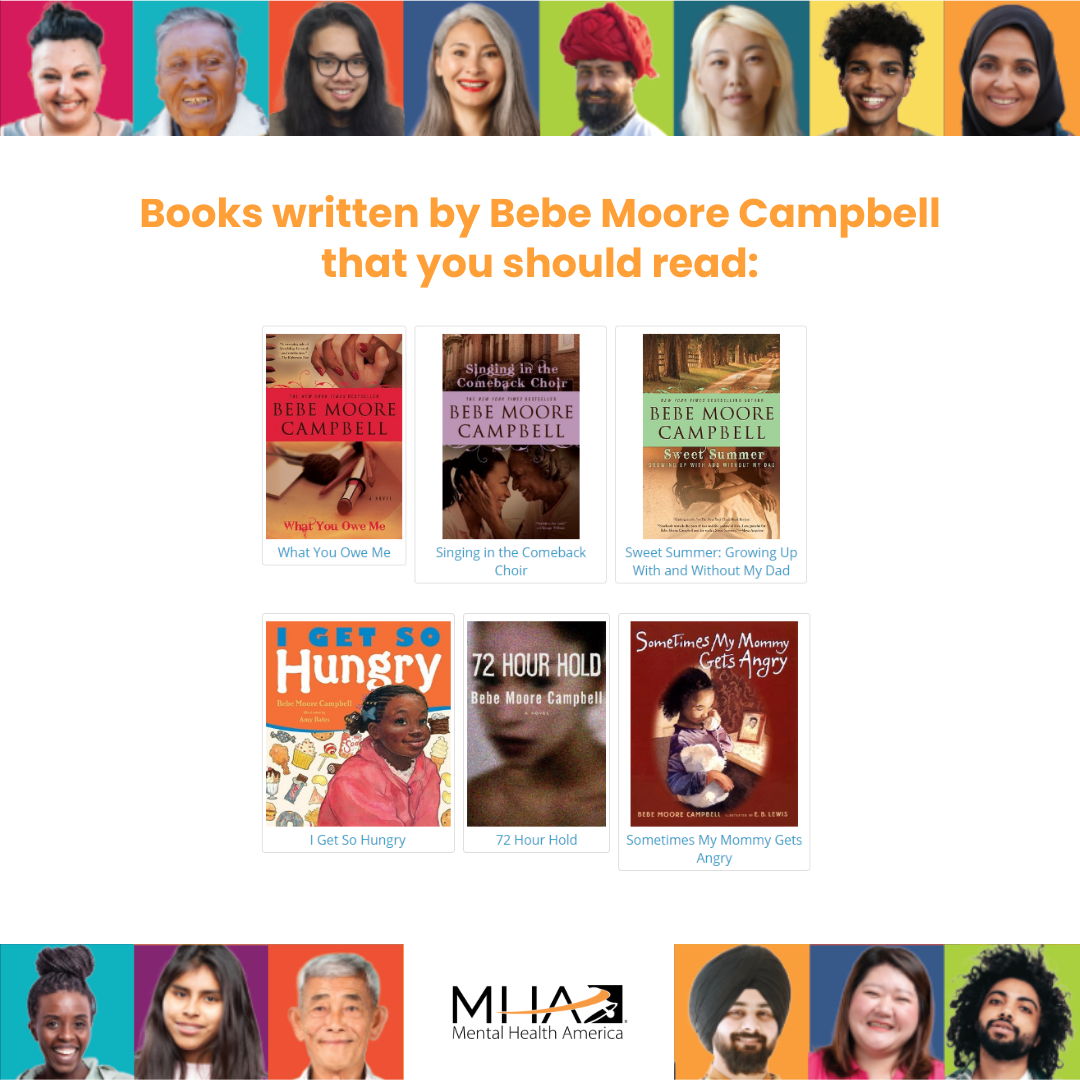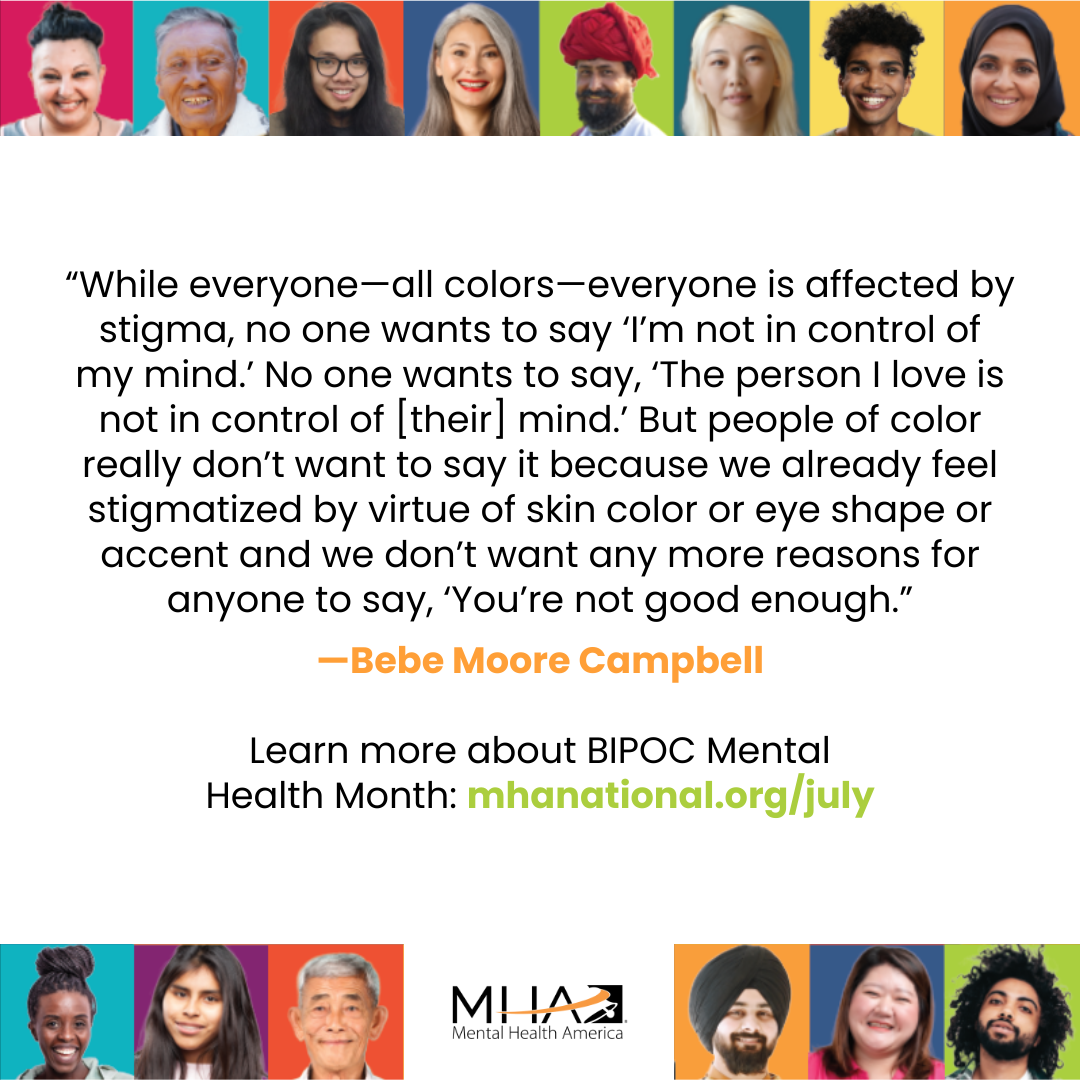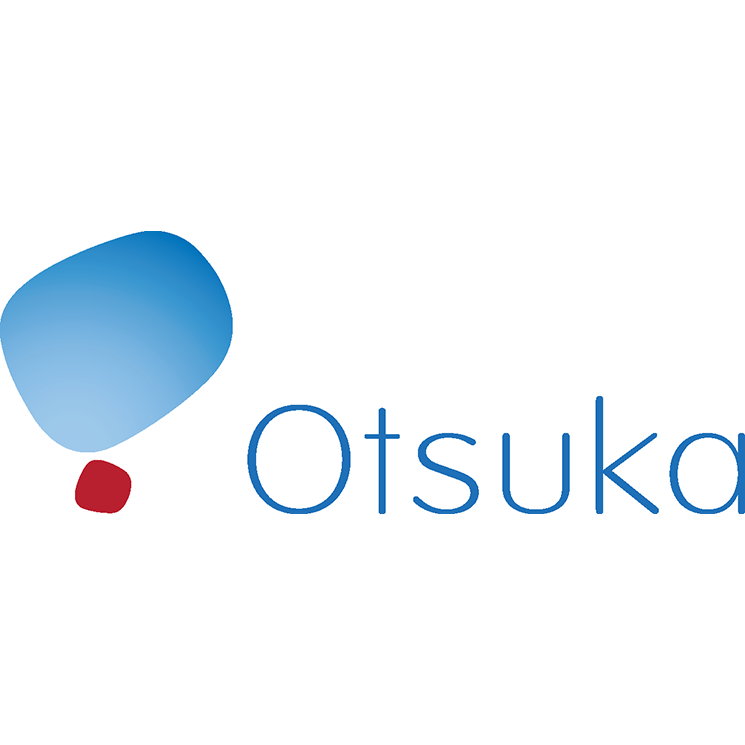BIPOC Mental Health Month
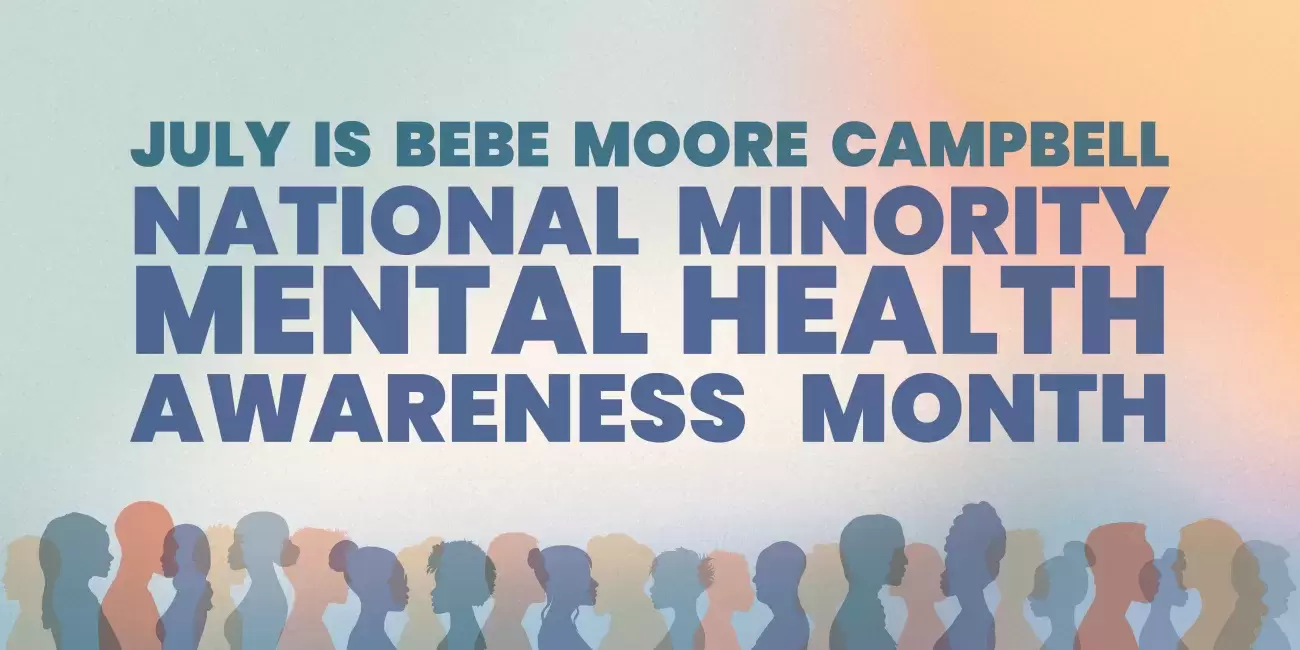
Each July, we honor the legacy of author, advocate, and trailblazer Bebe Moore Campbell by recognizing Bebe Moore Campbell National Minority Mental Health Awareness Month. Moore Campbell's ability to tell impactful stories highlighting themes of racism, mental health, and family left a lasting mark on this world and is a foundation for much of the work that continues in support of Black, Indigenous, and people of color (BIPOC) mental health.
Download the BIPOC Mental Health Toolkit
Mental Health America's 2024 BIPOC Mental Health Toolkit provides free, practical resources to help navigate mental health stigma, bridge generational differences, dismantle mental health myths, and encourage meaningful conversations.
Learn more about BIPOC mental health
Culture, ethnicity, and race all play a role in the way that each person experiences the world. These factors, among others, have profound effects on mental health, especially for Black, Indigenous, and people of color (BIPOC). MHA's BIPOC Mental Health Resource Center helps you learn more about the strengths and challenges communities of color face when it comes to mental well-being and mental health care.
New content
BIPOC mental health myth-busting
BIPOC voices
Welcome to Bebe Moore Campbell National Minority Mental Health Awareness Month
My intake nurse was judging me | Reina's mental health story
I had to be perfect | Leland's mental health story
I had to be perfect | Leland's mental health story
There's a lot of myths floating around | Future's mental health story
The person I am today was born | Lanee's mental health story
Breaking mental health stigma in BIPOC communities
Talking about mental health in BIPOC communities
Generational mental health differences in BIPOC communities
Graphics and shareables
Using graphics or messaging in your day-to-day communications is a great way to raise awareness about BIPOC mental health throughout the month. We've created sample text and graphics to make it easy for you.
Don't forget to tag us!
IG @mentalhealthamerica | X: @mentalhealtham
Facebook: mentalhealthamerica | LinkedIn: mental-health-america
Sample text
- July is Bebe Moore Campbell National Minority Mental Health Awareness Month. Learn more about BIPOC mental health at mhanational.org/july.
- Download Mental Health America’s #BIPOCMentalHealth toolkit to learn about mental health in BIPOC communities: mhanational.org/july.
- The 2024 #BIPOCMentalHealth Toolkit is now available! Celebrate Bebe Moore Campbell National Minority Mental Health Awareness Month by downloading your free copy at mhanational.org/july.
- Looking for #BIPOCMentalHealth resources? Check out Mental Health America’s BIPOC Mental Health Resouce Center at mhanational.org/bipoc.
- This July, join us in honoring the memory of Bebe Moore Campbell, an American author, journalist, teacher, and mental health advocate who worked to shed light on the mental health needs of the Black community and other underrepresented communities. mhanational.org/bebemoorecampbell.
- Expressing your feelings and needing help is not a sign of weakness - it’s a sign of strength. Learn more about stigma and mental health myths in the BIPOC community at mhanational.org/july.
- Myth: Mental illness is a white people problem.
Reality: We ALL have mental health and deserve proper care.
Learn more about BIPOC mental health at mhanational.org/bipoc. - Stigma feeds on silence. In honor of Bebe Moore Campbell National Minority Mental Health Awareness Month, Mental Health America has tools to help you break down stigma around #mentalhealth in BIPOC communities. Learn more at mhanational.org/july.
- Storytelling is one of the most effective ways to fight mental health stigma in BIPOC communities. When people who live with a mental health condition share their stories, it can help others feel less alone and reduce shame. #BIPOCMentalHealth
- Different generations in #BIPOC communities may face unique mental health challenges, but all age groups have unique wisdom to share. Learn more about sharing generational wisdom at mhanational.org/july. #BIPOCMentalHealth
- The first step in navigating your wellness journey is to check in on yourself. Take a free #mentalhealth test at mhascreening.org. #BIPOCMentalHealth
- Taking a mental health test is one of the easiest ways to check in on your #mentalhealth. Get screened at mhascreening.org. #BIPOCMentalHealth
- If you or someone you know is struggling or in crisis, help is available. Call or text 988 or chat 988lifeline.org. You can also reach Crisis Text Line by texting HELLO to 741741.
Hashtags
- #BIPOCMentalHealth
- #BebeMooreCampbell
Links
Take a Mental Health Test
Online screening is one of the quickest and easiest ways to determine whether you are experiencing symptoms of a mental health condition.
Formally recognized in June 2008 (and currently designated as), Bebe Moore Campbell National Minority Mental Health Awareness Month was created to bring awareness to the unique struggles that underrepresented groups face in regard to mental illness in the US. Bebe Moore Campbell was an American author, journalist, teacher, and mental health advocate who worked tirelessly to shed light on the mental health needs of the Black community and other underrepresented communities.
To continue the visionary work of Bebe Moore Campbell, each year Mental Health America (MHA) develops resources dedicated to addressing and supporting the mental health needs of Black, Indigenous, and People of Color (BIPOC).
2023 Theme: Culture, Community, and Connection
The theme of Mental Health America’s 2023 BIPOC Mental Health Campaign, developed in commemoration of Bebe Moore Campbell National Minority Mental Health Awareness Month, is Culture, Community, and Connection. Our lives are deeply intertwined with the environments around us. Who and what we are surrounded by impacts our mental health and overall wellness. In particular, Black, Indigenous, and people of color (BIPOC) populations are faced with disproportionate amounts of historical trauma and displacement that have challenged how these communities remain sustainable and continue to thrive. Despite countless attempts to take away power, erase histories, and diminish future successes, BIPOC communities continue to prosper. Culture, community, and connection are pillars that support and uplift BIPOC individuals when the dangers of oppression and systemic racism threaten the environments where BIPOC individuals live, work, play, and thrive.
In many ways, BIPOC communities have had to look out for themselves and for each other in order to simply survive the systemic racism that most still face to this day. There have been numerous attempts to erase BIPOC communities through genocide, war, famine, displacement, loss of power, loss of culture, and even loss of language. Despite that, BIPOC communities have been powerful, unyielding, and revolutionary in combating these attempts to diminish their worth and value. In addition, historically, the mental health narrative around BIPOC communities has been defined by disparities, trauma, and oppression – but what could BIPOC stories and lives look like if the narrative was changed? Imagine a narrative that instead uplifted and accepted community-created systems of support as fundamental cornerstones connecting one another and providing a safe haven.
BIPOC communities throughout history have carved out systems of support in order to sustain collective well-being. These systems have centered around community and connection, deeply rooted in sustained cultural traditions, language, stories, food, art, and more. Community has been an anchor, allowing connection in a world that is seeking to ostracize and isolate. It is the power of community that has brought forth movements and social change, health and wellness, knowledge, and strength.
The cultures of BIPOC communities are born from the richness of ancestral wisdom, survival practices, and support systems that have not only sustained life but allowed it to thrive and bloom in even the most hostile of environments. BIPOC communities look out for one another and ensure survival, and in cultural hubs, BIPOC communities remind their loved ones of cultural practices that may have otherwise been forgotten.
When we reach out for help, we not only begin to heal ourselves, but we heal our communities. If trauma and displacement have been illnesses, then connection is our medicine. Connection allows us to be known and to know others. We can lean on one another. We can support each other and get support in return. We challenge each other to be better. We challenge each other to keep going.
Mental Health America hopes that the 2023 BIPOC Mental Health Campaign supports you in connecting with your community and in advocating for more community-led and mentally healthy spaces.
"While everyone - all colors - everyone is affected by stigma - no one wants to say 'I'm not in control of my mind.' No one wants to say, 'The person I love is not in control of [their] mind.'
But people of color really don't want to say it because we already feel stigmatized by virtue of skin color or eye shape or accent and we don't want any more reasons for anyone to say, 'You're not good enough.'"
-Bebe Moore Campbell
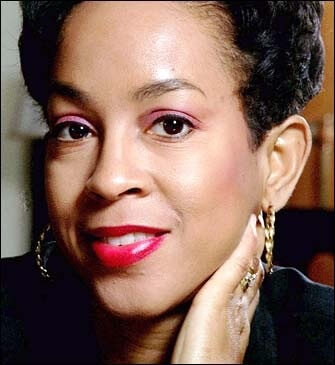 Bebe Moore Campbell was an American author, journalist, teacher, and mental health advocate who worked tirelessly to shed light on the mental health needs of the Black community and other underrepresented communities.
Bebe Moore Campbell was an American author, journalist, teacher, and mental health advocate who worked tirelessly to shed light on the mental health needs of the Black community and other underrepresented communities.
The establishment of the Bebe Moore Campbell National Minority Mental Health Awareness Month
Bebe Moore Campbell struggled to support her daughter who battled with mental illness and a system that prevented her daughter from getting help and support.
She founded NAMI-Inglewood in a predominantly Black neighborhood to create a space that was safe for Black people to talk about mental health concerns.
Throughout her time as an advocate, Campbell made her way to DC. On June 2, 2008, Congress formally recognized Bebe Moore Campbell National Minority Mental Health Awareness Month to bring awareness to the unique struggles that underrepresented groups face in regard to mental illness in the US.
Download graphics to share Bebe Moore Campbell's work. Don't forget to tag us!
IG: @mentalhealthamerica | Twitter: @mentalhealtham
Facebook: mentalhealthamerica | LinkedIn: mental-health-america
Download & share these images:
Novels
- Your Blues Ain't Like Mine (1992)
- Brothers and Sisters (1994)
- Singing in the Comeback Choir (1998)
- What You Owe Me (2001)
- 72 Hour Hold (2005)
Children's Books
- Sometimes My Mommy Gets Angry (2003)
- Stompin' at the Savoy (2006)
Non-Fiction Books
- Successful Women, Angry Men: Backlash in the Two-Career Marriage (1986)
- Sweet Summer: Growing Up With and Without My Dad (1989)
Selected Articles and Essays
- "Staying in the Community" (1989)
- "Daddy's Girl" (1992)
- "Remember the 60's?" (1992)
- "Brothers and Sisters" (1993)
- "I Felt Rage — Then Fear" (1993)
- "Only Men Can Prevent Spousal Abuse" (1994)
- "Coming Together: Can We See Beyond the Color of Our Skin?" (1995)
- "The Boy in the River" (1999)
- "Poor Health of African Americans" (2000)
This campaign is supported by contributions from The Access Foundation and Otsuka America Pharmaceutical, Inc.



